Did you know that there are lots medicinal extracts and tasty wild foods that can be made with roses? Roses are possibly the love of my life so this is quite the ode to them. People are usually fascinated to discover how easily they can make things from them. Here are recipes for using Roses as a wild foods, herbal medicines and natural cosmetics. I do hope that this inspires you to try things out.
So if you’re sitting comfortably then I’ll begin.
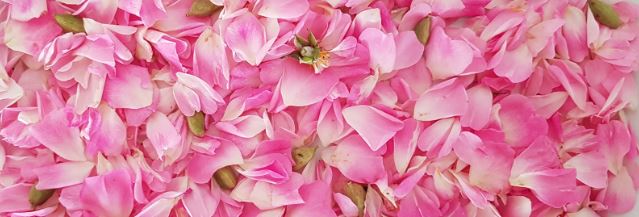
I love to teach about roses because we all know them but most people don’t realise that they can be used to make things: people with roses in their garden usually just watch them bloom then wilt and fall to the ground and rot not realising that they could use these. If you have a garden full of roses or have wild roses growing near you then here’s some inspiration for you. The roses really are prolific this year: get out there and use them, they want you to!
All of the Rosa spp. family whether wild or cultivated can be used as wild foods, herbal medicines or in natural skincare. If you have them in your garden and haven’t sprayed them with chemicals then you can use these ones. Please note that when I refer to Roses I am referring to members of the Rosa spp family, not the Christmas rose, Easter rose etc (these are types of Hellebore not Rosa). Top tip for identifying Rosa: they have beautiful beautiful flowers but also have sharp thorns!
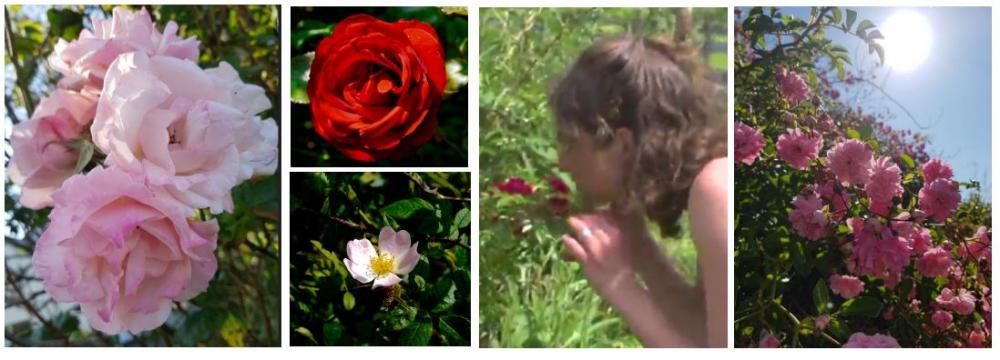
ROSES ARE EDIBLE
SALADS: The simplest way to use roses is to pick the fresh petals and add them to a salad. They go beautifully and look stunning in either savoury salads (combine them with lettuce or wild edible plants such as sorrel, chickweed, borage etc.), or fruit salads (cultivated fruits or foraged e.g. wild strawberries, wild raspberries etc.)
ICE CUBES: If you have mini-roses with small petals then use them to make ice-cubes. They look beautiful. Floral ice-cubes are a really easy way to make a drink (a cocktail or a non-alcoholic drink) look really special.
CORDIAL: Roses work really well in elderflower cordial and they turn it a beautiful pink colour (if you use rose petals that are a rich pink or red colour). Simply follow a recipe for elderflower cordial and use half fresh elderflower and half fresh roses instead of 100% elderflowers.
INFUSED HONEY: This is where it gets really yummy! Take a clean, dry glass jam jar. Fill it with rose petals. Pour on runny honey. Leave it to infuse for 2 weeks (keep topping it up with honey so that the petals are covered). Strain through muslin and pour the honey into the jar (put the used rose petals on the compost). Use this honey as it is (its delicious!), or use it to make fancy desserts: pour on top of ice-cream, baklava, rum baba….or use it to make these gorgeous chocolate truffles.
ROSE-INFUSED CHOCOLATE TRUFFLES:
This recipe uses the infused honey. These truffles taste wonderful, look very impressive but are very easy to make (don’t tell anyone that; pretend they took ages and that you’re really clever!).
Ingredients:
- coconut oil 300g
- infused rose honey 250ml
- cocoa powder 100g
- a little cardamon (optional)
Method:
Put the honey and coconut oil in a glass or stainless steel bowl over a pan of gently simmering water. Stir until these ingredients melt. Add in the cocoa powder and cardamom. Stir or whisk to blend well. Pour into ice-cube trays (the heart-shaped ones look really special but round or square ones are nice too). Put in the freezer until set. This usually takes 1-2 hours. Turn the chocolates out of the mold and onto a plate. Garnish with fresh rose petals. I once made these for all the guests at a wedding as a gift to the happy couple. The truffles went down a treat!
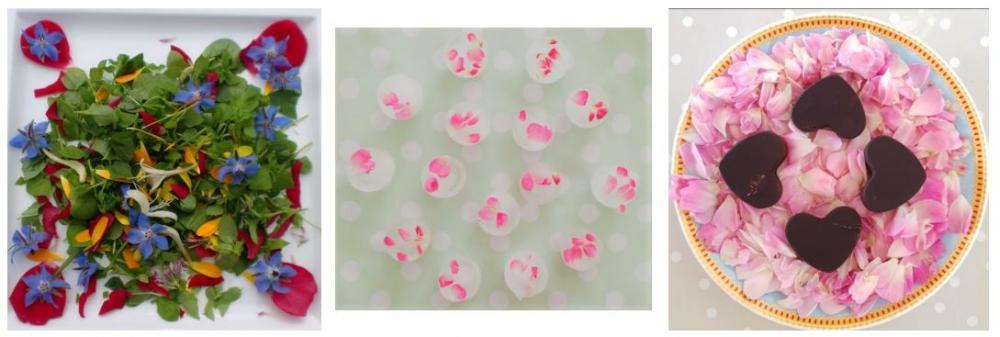
ROSES AS HERBAL MEDICINE*
Roses are a wonderful herbal medicine. They help to soothe the heart. I simply could not run my clinic without them. I’ve seen them help people who are suffering with all sorts of trauma, pain and emotional turmoil either from recent events or things that happened to them decades ago, yet roses are safe, gentle, non-addictive and often phenomenally healing. As humans beings we experience a wide-range of emotions yet pharmaceuticals only offer us anti-depressants. While these have a place I really do think that herbal medicine is invaluable in helping us with emotional support and transformation. I regularly use gentle herbs such as roses, lemon balm, lavender, oat straw, chamomile etc and am humbled and awed at how helpful they can be for people during some of the most distressing times of their lives. I also find roses excellent for helping to deal with stress and releasing tension headaches.
To use roses as a herbal medicine you can either make rose petal infusion (tea) from fresh or dried roses or you can make a tincture. Tinctures are the herb extracted in alcohol (alcohol is a solvent that extracts and preserves the goodness of the herb). Tinctures are easy to make. Take a clean, dry jam jar. Fill it with rose petals. Pour on brandy or vodka (whichever is your preferred tipple!) making sure you completely cover the roses with the alcohol. Leave this to stand for 2 weeks. Then strain it through muslin and bottle this liquid. The dosage varies depending on the reason for use but 20 drops taken when needed is a good dosage to start with for most people.
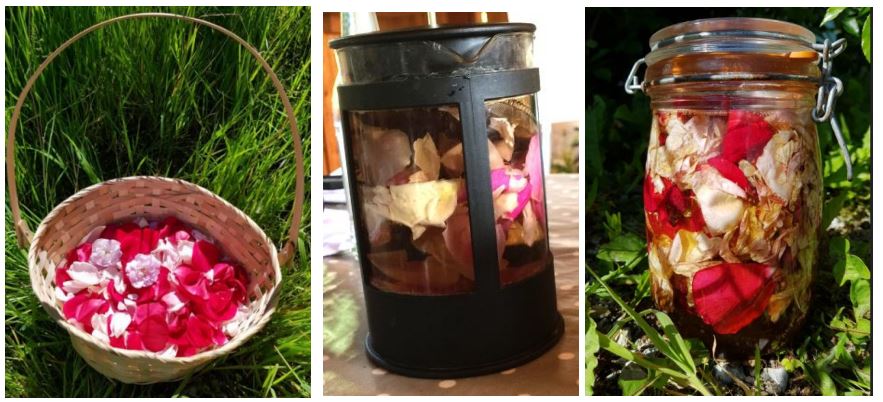
ROSES AS NATURAL SKINCARE & COSMETICS
Roses are very popular in cosmetics and skincare products but are notoriously expensive because they are usually made using the essential oil rose otto. It is an exceptionally expensive essential oil (£9,000 per litre the last time I checked!) because it takes such an enormous amount of roses to produce this oil. Around 1200 roses are used to make just 1ml (20 drops) of essential oil! Feel a rose petal: they are not very oily are they?
However, there is a lovely, inexpensive and easy way to use roses to make a beautiful oil that you can apply to your skin so that you get the luxury and therapy of that heavenly rosey scent without the expense of the essential oil. Rose infused or macerated oil is very easy to make. Take a clean, dry jam jar (again!): fill it with rose petals (ideally dry the rose petals first because the oil will keep better…if using fresh rose petals you must pick them during dry weather.. any water in the oil will cause mould to grow and you will need to throw it away). Cover the rose petals with a base or cooking oil e.g. sunflower, grapeseed, almond, peach kernal, apricot kernal etc. Fill the jar to the brim, making sure that the roses are covered in the oil. Place the jar in a warm dry place out of direct sunlight and away from strong sources of heat (it’s oil so this means it’s potentially flammable). Leave for 6 weeks. Strain. I use this infused oil in skincare (added to creams, serums etc) and on my pulses as a medicine (I find it great soothe away stress and tension headaches). It smells divine. Enjoy! If you’d like to learn more about making infused oils then do please check out my online course…There are videos showing different methods of making them in there.
DON’T try to ‘make your own rose water’! Don’t believe what you read on the internet at this time of year. Steeping or simmering roses in a pot of water does NOT make rose water: all it makes is what will rapidly become mouldy rose tea! (yet you’ll see this claim all over Facebook groups and blogs at this time of year). Rose water is distilled. Distilled waters are also called aromatic waters, hydrosols and hydrolats and you need proper distillation equipment to make them. If you would like to meet people who distill beautiful waters from aromatic plants e.g. roses, lavender, lemon balm, cypress, jasmine etc. then do please check out the Botanica conference….Several artisan specialist distillers will be at this conference giving lectures and in the international trade fair.
BATH: And finally, a lovely, easy-peasy thing to do with fresh roses petals is to chuck a few handfuls of them in to your bath. Lie back and enjoy the luxury: Heaven!

Vivienne Campbell Bsc (Hons) MNIMH is a qualified herbalist, foraging teacher and professional natural cosmetic formulator. She teaches classes in Ireland & UK and worldwide via her online video courses. Vivienne loves teaching people how to use herbs simply, effectively and joyfully. She believes it is everyone’s birth-right to know how to use common local plants as nutritious wild foods and health-enhancing natural remedies.
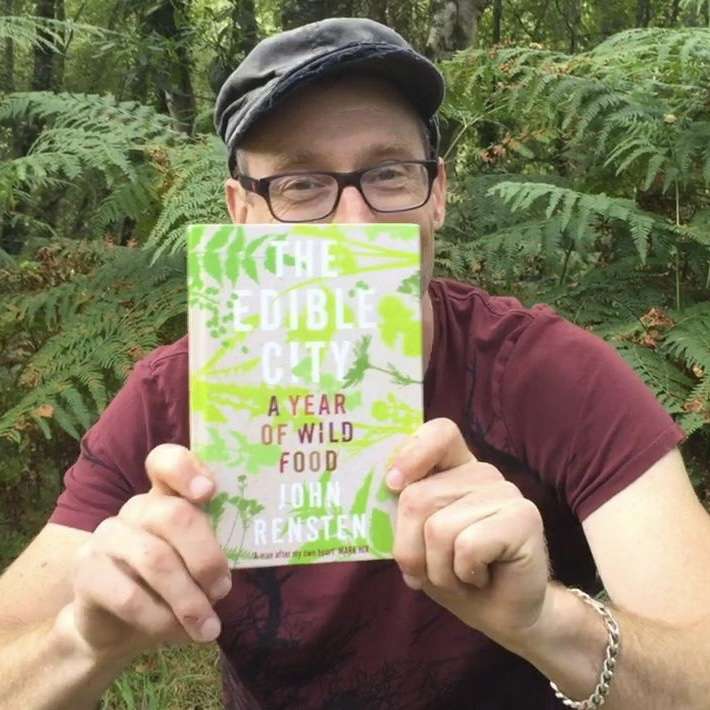
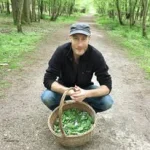

Hello, what percentage of vodka did you use for the rose tincture?
Thank you!